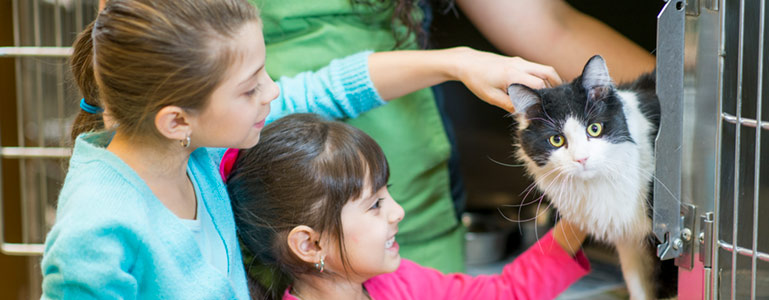Before you spontaneously head off the SPCA or Humane Society with your kids, consider taking some time to think through the decision to take on another family member. Pets need much more than just food and water, and it is important to consider whether your family is totally prepared or if your children can truly be responsible for helping with a pet.
Animals (ranging from hamsters to dogs) need regular veterinary check-ups, plenty of space, exercise, and lots of love and attention. Many compare bringing home a pet to having a baby—in the sense that it will take up your family’s time, space, and money!
What Are the Benefits of Pet Ownership?
Welcoming a pet into your family can be great for kids and parents too. Here are just a few reasons to consider getting a pet:
- Taking care of a pet can be a team effort that can strengthen family bonds;
- Pet ownership teaches kids about the responsibility that comes along with caring for another living thing;
- Pets make wonderful, nonjudgmental companions for kids learning to master new skills. Many pets are also great “listeners” and often create close bonds with children;
- If your child tends to be shy or uncomfortable in social situations, having a pet can greatly decrease anxiety and help children feel more comfortable with new people and places;
- Children who have pets early in their lives are less likely to be allergic to allergens such as other pets, dust mites, ragweed, and grass later on.
Start Your Research by Pet Sitting
Kids often are so excited about the prospect of pet ownership that they volunteer to take on the daily chores like feeding, cleaning, and walking—but they may not have the time or discipline to keep it up over time. Pet sitting can be a great way to see what pet ownership is like without making a long-term commitment. And parents can get a better idea of how to delegate chores when the family welcomes a pet permanently.
Consider Pet Age and Family Life Style
If your family envisions bringing home an adorable puppy or kitten in particular, it will likely need a lot of training. Training an animal takes time and patience, often more time than what the family had anticipated.
If your family does not have the time to train a puppy or kitten, adopting a senior dog or cat can be a wonderful option. Senior animals often are already trained, significantly calmer, and can spend more time alone. These qualities make it easier on families with working parents or busy family schedules.
Do allergies mean the end of a pet search? No! If someone in your family is allergic there is no need to give up on a pet. For a majority of animals there are hypoallergenic breeds, which could be a good option.
Besides dogs and cats there are smaller animals that are often considered “starter pets,” such as fish, lizards, hamsters, guinea pigs, and rabbits. People sometimes bring home these pets with the idea that they will take less work than a cat or dog. However, often families are met with the harsh reality that these animals still need a lot of care!
Animals such as guinea pigs and rabbits need larger cages, plenty of out-of-cage time, and regular veterinary checkups. Some lizards, like bearded dragons, require not just daily vegetables, but also live crickets for their meals. Smaller animals do make excellent companions, but it is important to know the amount of work and commitment required to take care of any animal.
Once you have found what seems like your perfect pet it is important that the animal meet your entire family—and anyone else that might be living at your home. This allows you to be sure that everyone gets along well and is ready for the new family member.
Finding the perfect pet for your family may be a challenge, but taking the time to make a thoughtful decision will make for a smoother transition. Good luck!
Jordan Leavitt-McGee is a summer intern at Jewish Family and Children’s Services of which Parents Place is a program. She has volunteered for many years with the San Francisco SPCA and loves animals.



